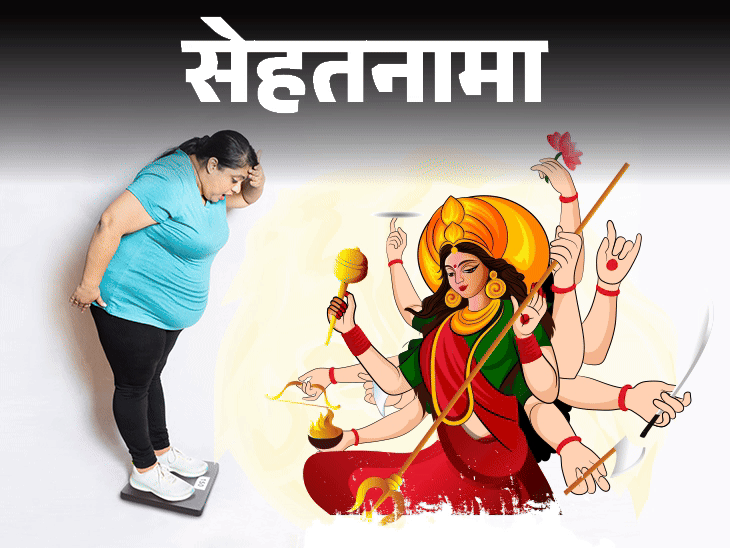3 minutes agoAuthor: Gaurav Tiwari
- copy link

Shardiya Navratri is towards its end. During these 9 days, people worshiped the 9 forms of Goddess Durga with great enthusiasm and devotion. Offered Prasad and adornments according to their local beliefs. Many people kept fast for 9 days. Everywhere fasting has its own beliefs. Some people give up food, some people eat sattvik food only once a day, while some people give up food completely and eat only water.
Navratri fast is like a good package for people suffering from obesity and overweight. They keep fast to please the Goddess, this also helps them in weight management. Now the big problem is how to return to your daily diet routine after completing the fast.
This question is asked because it is often seen that all the hard work done for weight loss during fasting days goes waste as soon as you return to the normal diet routine. The weight increases again, the belly appears again. This time the weight increases more rapidly. It also has a bad effect on the digestive system and liver.
so today ‘medical certificate‘ I will know why one should not immediately return to routine food habits after the Navratri fast is over. You will also learn that-
- Why does weight increase faster after completing the fast and with normal diet habits?
- What rules should be followed to maintain weight even after fasting?
Feel like eating spicy food after fasting
During the fast, people give up food. Eat satvik food made only from fruits and vegetables. Some people do not eat anything for 9 days and only drink water. The mind has to be controlled for these 9 days. Therefore, after the end of the fast, as soon as we realize that there are no restrictions in our food, our mind starts demanding something spicy.

Delhi-based nutritionist Dr. Amrita Mishra says that if you immediately eat fried and spicy food after breaking the fast, it can have a serious impact on your health.
During Navratri fast, people eat very little and light food for 9 days. Therefore the digestive system and metabolism come into rest mode. If you suddenly eat fried food, the liver will find it very difficult to digest it. This can cause problems related to the digestive system.
Obesity can increase rapidly after breaking the fast
According to a study published in the National Library of Medicine in October, 2019, people who have a bad lifestyle, whose social and economic conditions are such that they have to remain hungry often, such people have a higher risk of becoming obese and overweight. .
The study found that our brain keeps noting down our every small and big action. According to this, the internal body gives orders to the organs to work. If the brain is repeatedly noting that the body often faces hunger, then it will prepare for such a time the next time. This is why people who do not have enough food or who often face hunger are at higher risk of obesity. Exactly the same process happens during fasting. Our body is going through hunger, so as soon as we get food, it starts storing food to deal with this situation again in the future. This manifests as obesity.
Now, if the body follows this scientific formula and along with it, too much fatty food is also consumed, then its consequences can be even worse. This can increase obesity very rapidly.

Caution is necessary after breaking the fast
Dr. Hari Prasad Yadav, gastroenterologist at Medanta Hospital, Indore, says that eating too much fried food immediately after breaking the fast can cause stomach upset and also put more stress on the liver. Due to this, serious situations can arise. Therefore, it is important to eat light, easily digestible food in the initial days after breaking the fast. If someone eats very spicy or fatty food immediately after breaking the fast, it may cause burning sensation in the stomach and formation of gas. Ignoring these body signals can prove costly. Let us see in the graphic what mistakes we should avoid immediately after fasting.

Return to routine food habits gradually
Dr. Hari Prasad Yadav says that returning to routine food habit immediately after fasting can be difficult, it can cause indigestion or vomiting.
Consider it like this that in childhood we used to run 1-2 kilometers comfortably without getting tired. It was part of our game and daily routine. Now if suddenly you are asked to run so much and it is not a part of your daily habit, then you will start feeling breathless. This means that our lungs are not prepared for this and a lot of load is suddenly being put on them.
Exactly like this, all the organs of our body work. During fasting, our digestive system goes into rest mode. Then when suddenly it has to digest so much food, it starts responding. Due to this the problem of indigestion and vomiting starts.
Discipline is necessary if you want to maintain weight
The most important part of success in any field is discipline. As soon as it breaks, the results also start falling apart. Similarly, to maintain weight, discipline in the diet plan is necessary. Even after fasting, stay away from junk food and eat wholesome food. Don’t eat too many sugary foods.
Dr. Amrita Mishra says that after fasting, make sure that the food contains as much fiber and probiotics as possible. This will not put too much stress on the digestive system. Eat fruits, vegetables and whole grains for fiber. Include curd in your diet for probiotics.

…………………….. Read this news also
1. Health Nama- Does weight gain due to constipation: Constipation is the cause of many lifestyle diseases.

The root cause of constipation problem is our poor diet. We should eat things of our choice not for the taste of our tongue but for the trillions of friendly bacteria living in our stomach. Read the full news…
-
Health guide- How to increase hemoglobin: Include fruits and seeds, spinach, beetroot, pomegranate and pulses in your daily diet to increase hemoglobin.

- copy link
share
-
Health note- Chernobyl blast was caused due to sleep apnea: BP increasing due to snoring, heart patients, if you see 10 symptoms then consult a doctor.

- copy link
share
-
Health Naama- Cancer causing elements found in cake in Karnataka: Children’s favorite candy, ice cream, cake are home to diseases, never feed them these 10 things

- copy link
share
-
Health note- Birth control pills are helpful, but also dangerous: Do not take pills before 18 years and after 40, know the right way to take pills from the doctor.
- copy link
share



